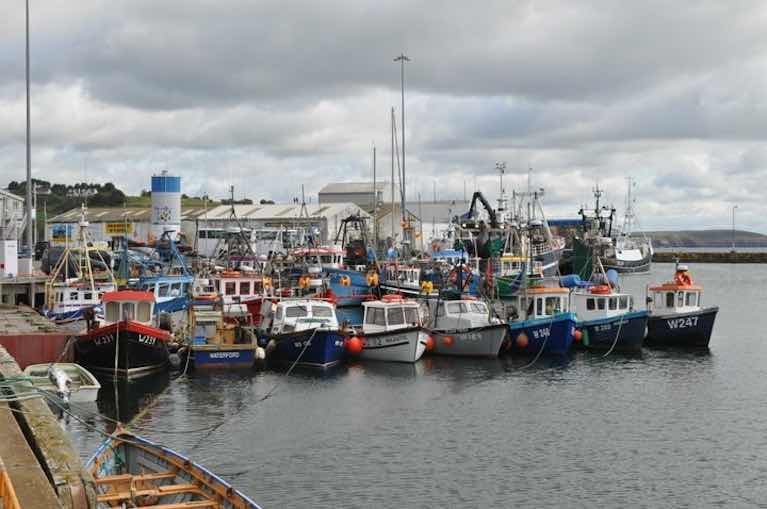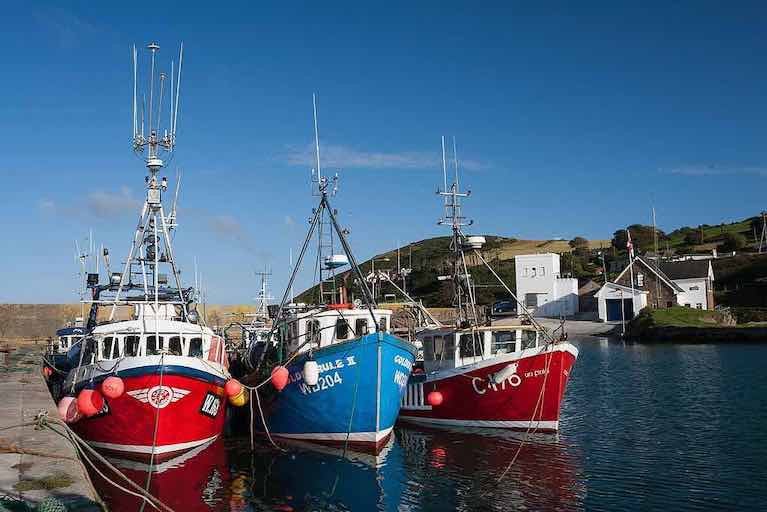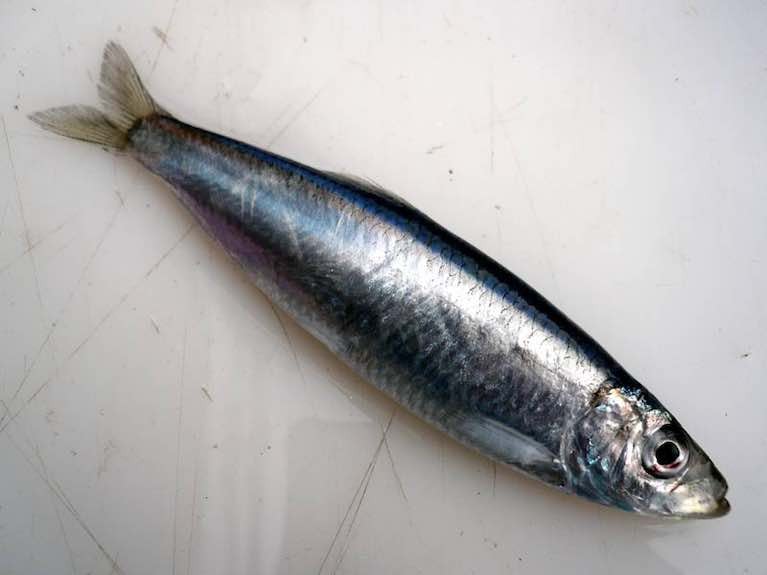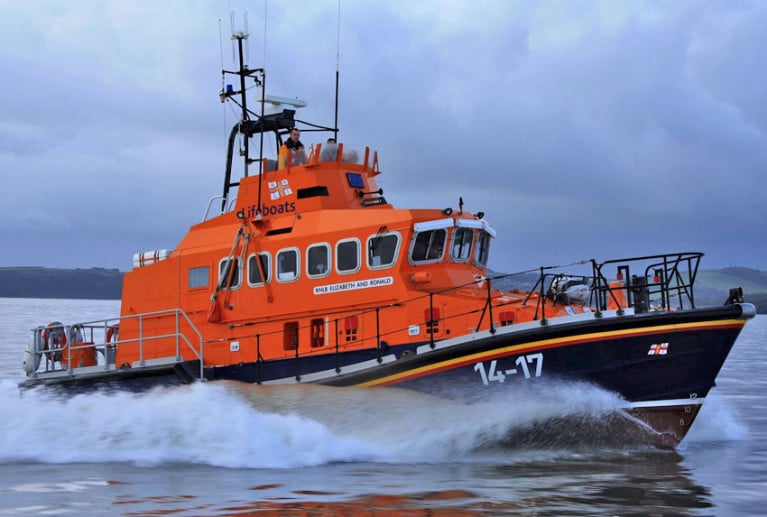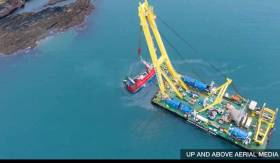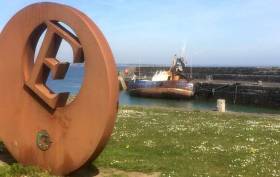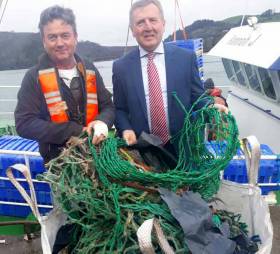Displaying items by tag: trawler
Naval Service Crew Receive Medical Treatment after Getting into Difficulties off Cork Coast
Naval Service crew members are understood to have received medical treatment after getting into difficulties while trying to board a fishing trawler.
The Irish Examiner understands the injured boarding party of five members were in a RHIB (Rigid-Hulled Inflatable Boat) which had been dispatched from the LÉ William Butler Yeats on Tuesday night to inspect the fishing boat which was off the Co Cork coast.
The RIB is believed to have capsized during the operation and a second RHIB was dispatched from the navy’s offshore patrol vessel to rescue them.
It is understood five personnel received medical treatment, with one believed to have been kept in hospital due to suspected broken ribs.
A spokesman for the Defence Forces press office said they were aware of an incident involving a Naval Service RHIB.
In a statement, the press office said: "All personnel that were on board the RHIB are safe and well. The Defence Forces does not comment on matters of an operational nature."
More on the incident here.
The Killybegs Fishermen’s Organisation (KFO) has called on the European Commission to act immediately on the presence of Russian trawlers in waters intended primarily for oil and gas exploration.
A fleet of Russian midwater freezer trawlers are currently operating in a zone shared between the UK and the Faroe islands - having been issued licences by the Faroes.
“What is most galling about this is that the Faroese are not just facilitating the access of the Russian boats, but they are also using their excessive blue whiting quota as a trade-off to ‘print currency’ or purchase cod quota from Russia,"* said Sean O'Donoghue, KFO Chief Executive.

“It flies in the face of sanctions which have been agreed against the Russians by the EU and while the Faroes have a degree of autonomy on fisheries, they form part of the Kingdom of Denmark and do not have independence on critical issues such as military strategy.
“It is paramount that our Government does everything in its power to compel the European Commission to nip this issue in the bud. Quite apart from the disregard for stocks and scientific advice, we are all acutely aware that any profits accrued to Russian businesses are indirectly funding the catastrophic war effort in Ukraine.
“Our counterparts in Scotland have vocally condemned the Faroese, highlighting the damage it will do to the stock. This year, the Faroes unilaterally increased their blue whiting quota from 82,000 tonnes to 267,413 tonnes. It appears that the Faroese are swapping the fish in an area they share with the UK for cod quota in Russian waters.
Pair Trawler Which Sank With Four Crew All Safely Rescued Issued No Alert, MCIB Report Notes
A fishing vessel which sank off the Wexford coast last January should have issued a “Pan Pan” alert, a report by the Marine Casualty Investigation Board (MCIB) has noted.
Four crew on board the FV Aztec were transferred successfully to a paired vessel, FV Western Dawn, after the incident occurred at approximately 11 am on January 11th, 2021.
The position was 500m south of Duncannon Fort in Co Wexford and weather was calm with a westerly force four and slight sea state.
The 11.89-metre trawler with a GRP hull was rigged for mid-water sprat fishing with FV Western Dawn”.
 FV Aztec Photo: via MCIB Report
FV Aztec Photo: via MCIB Report
It had in the region of ten tonnes of sprat onboard and was due to offload the catch later in the day at Duncannon harbour, the report says.
The MCIB describes it as “a very serious marine casualty resulting in the loss of the vessel”.
It says both vessels had been pair trawling for sprat at this time of year for the past eight years, and the skippers and crews of both vessels were “familiar with the processes involved in this type of pair trawling”.
It says there were “no risk assessments or method statements for pair trawling listed in the FV Aztec’s safety statement”, and says “effective risk assessments and procedures would have highlighted dangers associated with pair trawling”.
The report says the vessel was heavily laden at the time and dependant on the buoyancy provided by the steering compartment to maintain its longitudinal stability.
“ Although not required, the FV Aztec had stability calculations done in 2017 for a condition with ten tonnes of fish in the hold. These stability calculations concentrated on lateral stability and did not address longitudinal aspects of stability,”it says.
“ Although no limits are set for vessels of this size, the loading of the vessel was a contributory factor in the sinking,” the MCIB report says.
“ This must take into account the weight of the catch onboard as well as the positioning of fish in the hold. The effect of the additional catch being taken on board at the time of the incident will have also caused considerable settling by the stern and listing to starboard,” it says.
“The combination of these forces will have left the longitudinal stability of the vessel dependant on the buoyancy provided by the steering compartment,”it says.
A hole in the deck went unnoticed when it occurred and “should have merited further investigation”, it says.
It says no alert was sent out by the FV Aztec or by the FV Western Dawn, and the first notification of the foundering of the vessel to MRCC Dublin was from the shore.
“ Although there was no imminent danger to life, as a serious incident occurred, a Pan-Pan alert should have been raised with the Coast Guard,” it says.
It says the steering compartment of the FV Aztec had no bilge alarm fitted, and no means of directly pumping out this compartment, and notes that a small drain hole allowed water to drain from the steering compartment onto the fish hold.
The report recommends that the Minister for Transport should issue a marine notice to owners/skippers of fishing vessels reminding them to be aware of the safe loading capacity of their vessels.
It says owners and skippers should be advised to be aware - where the stability in a loaded state is dependent on a compartment’s watertight integrity - it is advisable that the compartment is alarmed and has a means of being pumped out.
It recommends the minister issue a marine notice to owners/skippers of fishing vessels reminding them that where an area of the deck is subjected to regular working and shock loading, consideration should be given to re-enforcing and strengthening that area.
It says the Minister should review the Code of Practice for fishing vessels under 15 metres to take into account heave loadings on decks during fishing operations.
It also says the code should be reviewed to take into account the maximum load of bulk fish a vessel is authorised to carry.
Environmental & Fishing Groups Make Joint Appeal to Reinstate Inshore Trawling Ban
Environmental and commercial fishing groups have joined forces to call for a restoration of a ban on trawling by larger vessels within six nautical miles of the coast.
Marine life such as dolphins, small scale fishing vessels and sea birds dependent on inshore stocks are threatened by the actions of larger fishing vessels, the groups point out.
A letter sent by 15 groups to Minister for Agriculture, Food and Marine Charlie McConalogue yesterday (Thursday, 29 October) calls on him to take the “steps necessary” to reinstate the ban and protect inshore stocks.
Former marine minister Michael Creed signed the new ban, applicable to fishing vessels over 18 metres working within six miles of the coast, into law from January 1st of this year.
A three-year “transition period” for vessels over 18m targeting sprat inside the six nautical mile zone was allowed.
However, the ban was recently overturned by the High Court in a judicial review taken by fishermen Tom Kennedy and Neil Minihane.
The National Inshore Fisherman's Association (NIFA) and National Inshore Fishermen’s Organisation (NIFO), Birdwatch Ireland, An Taisce, Cork Environmental Forum, Cork Nature Network, Coomhola Salmon Trust, Environmental Pillar and Friends of the Irish Environment are signatories to the appeal to Mr McConalogue.
The Irish Seal Sanctuary, Irish Whale and Dolphin Group, Irish Wildlife Trust, Oceana, Seas at Risk, Sustainable Water Network and Our Fish non-governmental organisations (NGOs) have also signed the letter.
The groups say that the policy directive, introduced by Mr Creed, “was one of the most important fisheries policy shifts in the history of the Irish state, and was broadly welcomed as being the right decision from a social, economic, environmental and a social justice perspective”.
The groups say it was backed by expert analysis by the Marine Institute and the Bord Iascaigh Mhara.
“The fishing industry and environmental NGOs are often portrayed as opposing forces, however, the reality is they have a common goal or vision for a healthy marine environment,” NIFA spokesman Alex Crowley said.
“Inshore fishers are acutely aware of the need for a healthy marine environment to support their businesses and way of life, and as an economic sector ... we are particularly exposed to negative environmental impacts,” Mr Crowley added.
Birdwatch Ireland policy officer Fintan Kelly said that “overfishing has hollowed out marine ecosystems” and had “a direct impact on the Irish fishing communities” that depend on collapsing stocks.
Our Fish programme director Rebecca Hubbard said that the Government can “ deliver on ambitions to halt the biodiversity and climate emergency” and “set an impressive example for other European countries to follow” by reinstating the ban.
The Department of Agriculture, Food and Marine said that the minister is “currently considering the implications of the judgment in consultation with his department officials and legal advisors”.
The department noted that “while the applicants did not succeed on four of the five grounds of challenge, the challenge was made against the entire policy directive and was successful”.
The High Court judgment found the policy directive did not impinge constitutional rights, was not disproportionate and did not breach EU law, the department noted.
However, it said that the challenge did succeed on the point that “given the impact... there was a particular duty on the Minister to provide a fuller explanation and engage in further talks with the applicants”.
Inshore Fishermen Warn Overturning of Ban on Larger Trawlers Inside Six Mile Limit is Worse Than a "No-Deal Brexit"
Irish inshore fishermen have said that a High Court ruling which overturns a Government ban on trawling by larger fishing vessels within the Irish six nautical mile limit is “likely to be more severe” on them than a “no-deal Brexit".
The National Inshore Fishermen’s Association (NIFA) said that the judgment published last week was “deeply disappointing” and “extremely worrying”.
It has called on the Minister for Agriculture, Food and Marine Charlie McConalogue to reinstate “without delay” the directive imposing the ban on trawlers over 18 metres in length from working inside the six nautical mile limit.
The Irish South and West Fish Producers Organisation (ISWFPO) has welcomed the outcome of the judicial review taken by fishermen Tom Kennedy and Neil Minihane.
Former marine minister Michael Creed had signed the ban into law from January 1st of this year.
Mr Creed conceded to a phased system for vessels over 18 metres in length fishing for sprat during 2020 and 2021, however.
 Sprat - there are calls for a 'robust scientific study' of this vital species to the ocean food chain in the wake of the High Court ruling Photo: illustration BIM
Sprat - there are calls for a 'robust scientific study' of this vital species to the ocean food chain in the wake of the High Court ruling Photo: illustration BIM
Mr Creed had said the “new protection of inshore waters” would “both support our small scale and island fishermen” and sea angling sectors, and would “provide wider ecosystem benefits, including for nursery areas and juvenile fish stocks”.
The NIFA says that the policy directive created a “huge opportunity for the inshore sector".
If “that opportunity is to be denied” as a result of the High Court ruling, then the inshore sector “faces a very uncertain future and possibly a complete collapse”, it said.
“The potential medium to long term negative impacts of the High court ruling on the inshore sector are likely to be far more severe than that of any “No Deal Brexit”, particularly when looked at in terms of equitable access to fisheries resources,” it said.
“The majority of Ireland’s fishing industry, the inshore sector, which accounts for over 80% of vessels in the fleet and is responsible for over 50% of direct employment in the industry is almost exclusively dependent on the resources inside the six nautical mile zone and does not depend on access to UK waters,” NIFA said.
“Despite that dependency, the majority of the resources inside that zone are harvested by a very small number of larger trawlers,” it said, and many smaller vessels said they could not compete with them.
“Over previous decades, the inshore sector has lost much opportunity and entitlement to access to fishery resources previously available to it,” NIFA said.
The Irish Wildlife Trust (IWT) has also voiced concern and has called on Mr McConalogue and Minister of State for Biodiversity Pippa Hackett to “act swiftly” and take steps to reinstate the ban.
The Irish Whale and Dolphin Group (IWDG) has called for a scientific study of sprat stocks in inshore waters.
IWDG co-ordinator Dr Simon Berrow said that while he did not want to comment directly on the judgment, it was time for a “proper, robust scientific study” on sprat stocks.
Calls for Ministerial Action & for Scientific Studies after High Court Ruling on Trawling Ban by Larger Vessels Inside 6 Nautical Miles
The Irish Wildlife Trust (IWT) has called on Minister for Marine Charlie McConalogue and Minister of State for Biodiversity Pippa Hackett to “act swiftly” over a High Court decision that overturns a ban on fishing by vessels over 18 metres long inside the six nautical mile limit.
The Irish Whale and Dolphin Group (IWDG) has also called for a scientific study of species including sprat stocks in inshore waters.
A High Court judgment published last week found that the ban on trawling or fishing within seine nets by vessels over 18 metres in length inside the six-mile nautical limit has “no legal effect”.
Mr Justice Michael McGrath issued his judgment on foot of a judicial review of the ban which was introduced by former marine minister Michael Creed in March 2019.
The judicial review of the policy directive was taken by fishermen Tom Kennedy and Neil Minihane.
IWT campaign officer Pádraic Fogarty said that the original ban was initiated “after a public consultation in 2018 which was roundly supported by low-impact fishers in smaller boats, anglers, environmental groups and members of the public”.
“It was heralded at the time as the single most important move to protect fisheries and marine biodiversity that we have seen. There is consequently widespread anger and dismay that this has now been undone,” Mr Fogarty said in a statement.
“We’re urging ministers Hackett and McConalogue to act swiftly on this High Court decision and to tell us how the trawling ban can be reinstated on a permanent basis,” he said.
“ Until then we need to see all inshore trawling shut down so that any recovery in marine life which may have been underway is not completely undone,” Mr Fogarty said.
The IWT says that trawling for small fish such as sprat “removes the principle food source for sea life, whether its whales, dolphins or larger fish”.
“Bottom trawling, which scrapes a net across the seafloor, obliterates important habitats for fish spawning and should be phased out across our seas,” it says.
IWDG co-ordinator Dr Simon Berrow said that while he did not want to comment directly on the judgment, it was time for a “proper, robust scientific study” on sprat stocks.
“We know so little about sprat,” Dr Berrow told RTÉ Radio 1’s Seascapes on Friday night, pointing out how important the species is for whales.
The six-mile ban for larger vessels was introduced by Minister Michael Creed on 5th March 2019, and came into force on January 1st of this year.
The directive did give a derogation for fishing sprat within six nautical miles up to December 2021, “subject to any catch limits as may be determined by the minister from time to time”.
The Irish South and West Fish Producers Organisation (ISWFPO) has welcomed the judgment. Its chief executive Patrick Murphy said that “once again, we see flawed legislation being overturned in our High Court “.
“The view of IS&WFPO members remains that only a small proportion of fishing boats in our tiny Irish fishing fleet of 165 vessels of over 18 meters in length actually fish inside of the six-mile limit,” he said.
Mr Murphy concurred with the IWDG in calling for a scientific evaluation to calculate the biomass of all commercial stocks within the six-mile zone.
“Until this assessment is complete, we submit that no total allowable quota figure should be set for this important fishery,” he said.
Body Found In Search For Missing Fisherman Off Hook Head
A body has been found in the search for a fisherman missing after a fishing vessel sank off Hook Head earlier this month, as The Irish Times reports.
One man died when the trawler Alize went down off the Wexford coast while fishing for scallops. He was later named as Joe Sinnott (65) from Kilmore.
His fellow fisherman, Willie Whelan (41) from Fethard-on-Sea, has been missing since the incident on Saturday 4 January.
A diver from the Hook Head Sub Aqua Unit found a body yesterday morning (22 January) but it has yet to be formally identified.
The Irish Times has more on the story HERE.
Cork Registered Fishing Vessel Raised from the Seabed off Ardglass
Ardglass, on the southern coast of County Down, has one of the Northern Ireland’s main fishing harbours, is home to over 30 fishing vessels and is the main hub for the region’s pelagic fish processing industry writes Betty Armstrong
As reported in the Down Recorder, the sea off the port was the scene of a dramatic recovery of a fishing vessel from the seabed on Monday of this week.
On 23rd October, a trawler registered in Co Cork, got into difficulty trying to offload its catch of mackerel, lost power and drifted onto rocks in the early hours. As it was being towed back to port, the vessel sank but crew were rescued. The seagulls made short work of the catch!
However, it is reported that, earlier this week the trawler was successfully lifted off the seabed with specialist gear onto a barge and will be inspected in a Scottish port.
Council Pays Cost of Scrapping Abandoned Fishing Trawler at Ballyhalbert
Ards and North Down Borough Council paid £36,000 to scrap an abandoned fishing trawler in Ballyhalbert harbour on the Ards Peninsula writes Betty Armstrong.
Ballyhalbert is a small seaside village on the Irish Sea coast of the Ards Peninsula at Burr Point, the most easterly part of Ireland. It has a small harbour, most of which dries and it is home to a few small fishing vessels.
But for over two years, it had been blighted by an abandoned fishing vessel which, say locals, had been moved under cover of darkness to Ballyhalbert.
"For over two years, Ballyhalbert had been blighted by an abandoned fishing vessel"
The vessel has now been dismantled but the Department of Agriculture, Environment and Rural Affairs (DAEFRA) has no role in the management of the Harbour or in the movement of a privately-owned vessel. The harbour authority for this facility is Ards and North Down Borough Council and so the reported £36,000 cost of the dismantling fell to them.
And to make matters more difficult, as Ballyhalbert is not a designated dismantling site, the vessel was moved to the large fishing port of Portavogie, adding to the cost of the work – reportedly by £14,000.
The County Down Spectator reports that Alderman Angus Carson described the whole process as a ‘big learning curve’ for the Council and said: “I hope that we never, never have to face the same issue again”.
To date, the person who moved the boat to Ballyhalbert has not been traced.
Target for 100% of Irish Trawlers to Recover Plastic Waste from the Oceans on Every Fishing Trip
Minister for Agriculture, Food & the Marine, Michael Creed T.D., today announced Ireland's Clean Oceans Initiative and called for the participation of the entire Irish trawl fishing fleet in the scheme by 31st December 2019. His ambition is to have all Irish trawlers at every pier and every port actively participating in Ireland’s first coordinated initiative on land and at sea to collect, reduce and reuse marine litter and clean up our marine environment. Building on the very successful Fishing for Litter campaign the Minister has challenged BIM to work with the fishing industry to ensure participation of 100% of Irish trawlers in the Clean Oceans Initiative by the end of 2019. BIM will report to him quarterly on the progress being made to meet that target.
Speaking at the launch of Ireland’s Clean Oceans Initiative in the fishing port of Union Hall today Minister Creed said:
“I recognise that co-ordinated action is required on land and at sea to address the serious issue of pollution of the Oceans with plastics. This threatens our fish stocks, the wider marine environment and the future of our fishing industry. I am setting out a challenge for our fishing industry to set a world first by having all of our fishing trawlers cleaning and removing plastic from the ocean every day, as they go about their activity at sea. This is good for the marine environment, fish stocks and our fishing industry. This is a challenge which I am confident our fishing industry will rise to and succeed in setting an example for other nations.”
Creed went on to say “We can only solve the problem of plastics in our oceans by working collaboratively. Ireland’s “Clean Oceans Initiative” which I am launching today, aims to mobilise every member of the Irish seafood sector and its wider communities – every fishing port, fishery harbour and pier in Ireland - to take action. I believe that our fishing industry will build on the good work they have been voluntarily doing to date on marine litter, to get every trawler in the Irish fleet involved, to show how we can begin to address this great global challenge of our time. Everyone has a responsibility for marine litter and we intend to take on that responsibility through Ireland’s “Clean Oceans Initiative” .”
Fishermen have been living in harmony with the marine environment since the beginning of time, they share Minister Creed’s concerns and they have a key role to play in recovering discarded plastics from the oceans. Our fishing vessels are towing nets through the waters around our coast on a daily basis and often find debris, including waste plastics, when the nets are hauled. Minister Creed wants to facilitate our fishermen to bring this waste home from their fishing trip and he is encouraging our fishermen to recover as much plastic as possible from the seas around Ireland. He has made funding available under Ireland’s European Maritime and Fisheries Fund (EMFF) to support the new “Clean Oceans Initiative” to provide on-board storage facilities and on-shore infrastructure for environmentally friendly disposal of all plastics, waste, ghost fishing gear, etc. recovered at sea. The on-shore infrastructure will also be available to fishermen and aquaculture operators to dispose of unwanted fishing gear and other items with plastic content.
In addition to the “Clean Oceans Initiative” Minister Creed has asked BIM to assemble a collaborative team representative of all stakeholders to focus on solutions for marine litter prevention and removal. The team will include fishermen and fish farmers, net makers, harbour authorities, fish processors, community groups, Fisheries Local Action Groups (FLAGs), academics and NGOs. He has also asked BIM to include a broader outreach to the wider coastal community, of which the seafood community are a vital and intrinsic part and to report back to him by the end of 2019 with proposals for further innovative solutions for the prevention and removal of marine litter.
Contamination in the marine environment is not a new phenomenon and up to 80% of marine debris is made up of plastics. Total World production of plastics reached 335 million metric tons in 2016. Plastics do not biodegrade, they photo-degrade, breaking up from recognisable items of all sizes and shapes into tiny particulates. The risks posed to marine wildlife by waste plastics has motivated research to assess the extent of the problem and this is welcomed but we cannot afford to delay remedial actions so the Minister for Agriculture, Food and the Marine, Micheal Creed T.D. has decided to act now and promote all possible measures to prevent plastics from entering our marine environment and to remove as much plastic from the marine environment as possible.



























